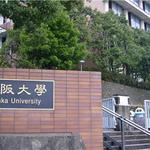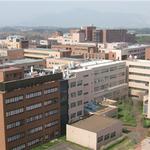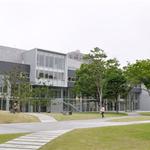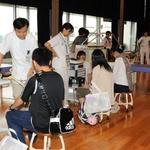Introduction to Kitasato University
Overview
Kitasato University is a famous private university located in Tokyo, Japan, referred to as "Kitasato University". The school was founded in 1893 by Mr. Shibasaburo Kitasato, the father of Japanese bacteriology, the father of modern Japanese medicine, and the pioneer of serology, and officially opened university education in 1962. Kitasato University is famous for its outstanding research and education in the fields of life sciences and medicine. It is a first-class private university in Japan and even in the world.
Campus
The main campuses of Kitasato University include:
Kitasato Campus: Located in Minato-ku, Tokyo, it is the main campus of the school, mainly responsible for teaching and research tasks in medicine, pharmacy, science and other majors.
Yagai Campus: Located in Ota-ku, Tokyo, it mainly undertakes teaching tasks in the Department of Health Care and Nursing.
Shonan Campus: Located in Fujisawa City, Kanagawa Prefecture, it mainly undertakes teaching tasks in the Department of Veterinary Medicine.
Educational philosophy
Kitasato University adheres to the educational philosophy of "cultivating talents with a high sense of social responsibility and professional skills through education and research", and emphasizes the cultivation of students' independent thinking and practical abilities. The school is committed to cultivating high-quality talents with professional knowledge and practical abilities through a comprehensive education system and a high-level research platform, and to contributing to the development of society.
Disciplines and majors
Kitasato University has multiple faculties and graduate schools covering a wide range of fields:
Faculty of Medicine
Faculty of Medicine: Cultivate doctors with medical professional knowledge and clinical skills.
Faculty of Pharmacy
Faculty of Pharmacy: Cultivate pharmacists with pharmaceutical professional knowledge and drug development capabilities.
Faculty of Science
Faculty of Biology: Learn the basic theories and practical methods of biology, and cultivate professionals who can work in the fields of biological research and education.
Faculty of Chemistry: Learn the basic theories and practical methods of chemistry, and cultivate professionals who can work in the fields of chemical research and industrial production.
Faculty of Health Care
Faculty of Rehabilitation Therapy: Learn the basic theories and practical methods of rehabilitation therapy, and cultivate professionals who can work in the field of rehabilitation medicine.
Faculty of Radiological Technology: Learn the basic theories and practical methods of radiological technology, and cultivate professionals who can work in the field of radiological medicine.
Nursing Department
Nursing Department: Learn the basic theories and practical methods of nursing, and cultivate professionals who can work in the nursing field.
Veterinary Department
Veterinary Department: Learn the basic theories and practical methods of veterinary medicine, and cultivate professionals who can work in the veterinary field.
Featured Courses
Medical Department: Learn the basic theories and practical methods of basic medicine, clinical medicine, public health, etc.
Pharmacy Department: Learn the basic theories and practical methods of pharmacology, medicinal chemistry, drug analysis, etc.
Biology Department: Learn the basic theories and practical methods of cell biology, molecular biology, ecology, etc.
Chemistry Department: Learn the basic theories and practical methods of organic chemistry, inorganic chemistry, physical chemistry, etc.
Rehabilitation Therapy Department: Learn the basic theories and practical methods of rehabilitation medicine, physical therapy, occupational therapy, etc.
Radiotherapy Department: Learn the basic theories and practical methods of radiation physics, radiation diagnosis, radiation therapy, etc.
Nursing Department: Learn the basic theories and practical methods of nursing, clinical nursing, nursing management, etc.
Veterinary Department: Learn the basic theories and practical methods of basic veterinary medicine, veterinary clinical medicine, veterinary public health, etc.
Practical teaching
Kitasato University attaches great importance to practical teaching. It has advanced laboratories and practice bases, providing students with rich practical teaching resources. The school has established cooperative relationships with many medical institutions, research institutions and enterprises, providing students with rich internship and practice opportunities. The school also has practical platforms such as simulation laboratories and studios, providing students with a platform for practical operation.
International exchange
Kitasato University actively participates in international exchange programs and has established cooperative relationships with universities in many countries to provide students with opportunities for overseas study and exchange. The school has an international student office to provide comprehensive support and services for international students.
Employment situation
Kitasato University performs well in terms of employment rate. According to the latest statistics, the employment rate of graduates is relatively high. The school has a career guidance center to provide students with employment consultation, resume writing guidance and interview skills training to help students find employment smoothly.
Cost
Admission fee: about 200,000 yen
Tuition fee:
About 1.2 million to 1.6 million yen per year (depending on different departments and subjects)
The specific cost may change. It is recommended to consult the school directly for the latest information.
Campus
Kitasato University has a beautiful campus with complete facilities, including modern teaching buildings, laboratories, libraries and sports facilities. The school also has student dormitories to provide convenient living conditions for out-of-town students.
Contact Information
Tel: +81-3-3403-1111
Fax: +81-3-3403-1211
Email: info@kitasato-u.ac.jp
Other Information
Internship Opportunities: The school has established cooperative relationships with many medical institutions, research institutions and enterprises, providing students with abundant internship and practice opportunities.
Employment Support: The school has a career guidance center to provide students with employment consultation, resume writing guidance and interview skills training to help students find employment smoothly.
Scholarship System: The school has a variety of scholarship systems to help students reduce their financial burden.
-

The University of Tokyo
-

Kyoto University
-

Osaka University
-

Waseda University
-

Hitotsubashi University
-

Nagoya University
-

Tokyo Institute of Technology
-

University of Tsukuba
-

Keio University
-

Tohoku University
-

Mesoamerican University
-

Istmo University
-

Mariano Galvez University of Guatemala
-

Regional University of Guatemala
-

Galileo University
-

Francisco Marroquín University
-

Rafael Landívar University
-

University of the Valley of Guatemala
-

University of San Carlos of Guatemala
-

Technological Institute of Tlaxcala Plateau
-

Golfo University
-

Technological University of South Sonora
-

Technological University of Huejotzingo
-

Tizimín Institute of Technology
-

Chilpancingo Institute of Technology

